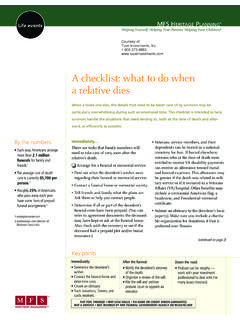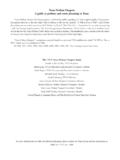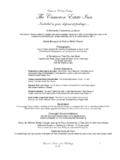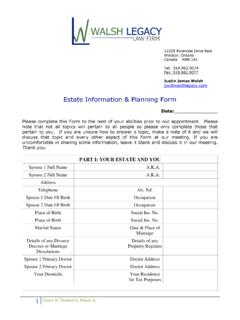Transcription of IRD: A tax rule beneficiaries need to know - Tuve …
1 IRD: A tax rule beneficiaries need to know Did you know that if you leave 401(k) assets and certain other types of assets to your heirs, they could be considered income in respect of a decedent (IRD) and be subject todouble taxation? Taking IRDs into consideration now could result in significant tax savingsfor your heirs later. It pays to plan is IRD?Income in respect of a decedent is incomethat is payable after the death of the per-son who was entitled to it and that wouldhave been taxable to him or her if the per-son had lived to receive it.
2 The income isnot includible in the decedent s final taxreturn because it was not payable untilafter death, but it is taxable to the estate orthe kinds of income are IRD?There are various types of income that canbe IRD, but some of the most common typesare unpaid compensation owing at death,retirement plan benefits, and commercialannuities. Unpaid compensation owing at deathIf a person dies prior to retirement, he orshe is likely to be owed some amount ofmoney in connection with his or heremployment. The employer may owe theindividual a check for unused vacation timeor a client may not yet have paid a fee forservices rendered.
3 The decedent had earnedthe right to receive these amounts, whichwould have been includible in the person sgross income if he or she had lived to receivethem. However, they are not includible inthe decedent s final tax return because theywere not payable until after death.(continued on page 2)Inherited estates of up to $2 million do not fall under the IRS definition of taxable income. However,there are some exceptions called IRDs you llwant to consider when planning the disposition of your examples include: qualified retirement plan distributions traditional IRA distributions any remaining employee compensationKey pointsBy the numbers Don t look for a one-size-fits-allestate plan .
4 It doesn texist. The right plan for youwill depend on your personalcircumstances. Two can be subject to income tax andestate tax. Double taxationcan be mitigated by using aparticular IRS deduction,known as the IRD or Section691(c) deduction.* MFS HERITAGEPLANNING MFS Heritage PlanniEstateplanningHelping Yourself. Helping Your Parents. Helping Your Children. NOT FDIC INSURED MAY LOSE VALUE NO BANK OR CREDIT UNION GUARANTEENOT A DEPOSIT NOT INSURED BY ANY FEDERAL GOVERNMENT AGENCY OR NCUA/NCUSIF*Source: The Hot Potato of Wealth Transfer,April, is an example:Fred earned the right to receive a$3,000 quarterly bonus from hisemployer based on his work per-formance from January 1 throughMarch 31 of 2006, but his companydoes not actually pay the bonuses toemployees until May 1.
5 Fred diedon April 19, 2006. The $3,000 bonusisn t includible in Fred s final taxreturn for calendar year 2006because, although he had earned theright to receive the bonus, it wasn tpayable until after he died. The$3,000 is considered to be IRD andwill be taxable to his estate or to plan benefitsMost of the money invested inemployer-sponsored retirementplans and traditional IndividualRetirement Accounts (IRAs) wentinto the plan or IRA on a pretaxbasis and therefore is taxable tothem when it s distributed.
6 If theplan participant or IRA owner dieswith money remaining in his or heraccount, distributions made to theperson s beneficiary after death willbe considered IRD to the recipientbecause these distributions wouldhave been taxable to the decedent ifhe or she had received both qualified and nonquali-fied annuities, the death benefitgenerally is included in the owner sgross estate . In addition, the benefi-ciary must pay income taxes on anyearnings. Is IRD property included in thetaxable estate for estate taxpurposes?
7 Yes,IRD items are included as partof the decedent s taxable estate , andif the estate is larger than the appli-cable credit ($2 million for decedentswho died in 2006 and 2007), theestate will be subject to IRD can be subject to two taxes income tax and estate tax?It can, but the income tax system provides some relief fromthe double taxation to recipients of IRD in the form of an income tax deduction equal to their proportionate share of the estatetaxes paid on the IRD. This deduction is frequently referred to as the IRD deduction or theSection 691(c) is the income tax deduction for estate taxes onIRD calculated?
8 First, you have to calculate the estatetaxes due on the entire estate , andthen you subtract the item of IRDand calculate the estate tax difference between the results isthe amount of federal estate taxattributable to the item of IRD. Iftwo or more beneficiaries share theitem of IRD, each beneficiary s per-centage of the total tax deductionwill be equal to his or her percentageof the item of Study: Helen and KevinThis is a simplified hypotheticalexample to illustrate how the IRDdeduction could reduce your overalltax liability.
9 The late Helen s $3,000,000 estate (after deductions and exemptions) is valued at $2,657,140. Assuming a35% federal estate tax rate, the totalfederal estate tax comes to $930,000,(no federal income or state taxes areincluded in this example). Helen hadnamed her grown son Kevin as thebeneficiary of her IRA, valued at$240,000. When the estate tax isrecalculated excluding the IRA, thetax comes to $810,000. Therefore,the estate tax attributable to the IRAis $120,000 ($930,000 less $810,000).Because the IRA is IRD, Kevin is sub-ject to income tax on his s inheritance, along with hisother income for the year, wouldordinarily put him into the 35% taxbracket.
10 However, Kevin can effec-tively reduce his tax liability byclaiming the IRD deduction for thefederal estate taxes attributable tothe IRA. So Kevin s tax return will reflect the following: total IRD includible in income =$240,000 less deduction for estate taxes paid($120,000) IRD subject to income tax after deduction= $120,000 income tax on IRD at 35% = $42,000(continued on page 3)MFS HERITAGEPLANNING MFS Heritage PlanniEstateplanningHelping Yourself. Helping Your Parents. Helping Your Children. 2(continued from page 2)What planning strategies exist?







